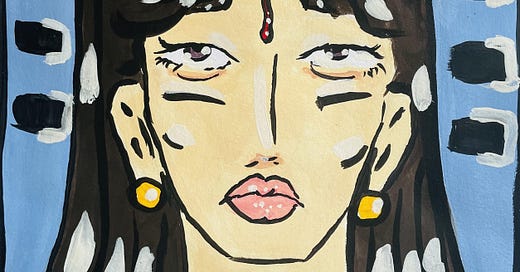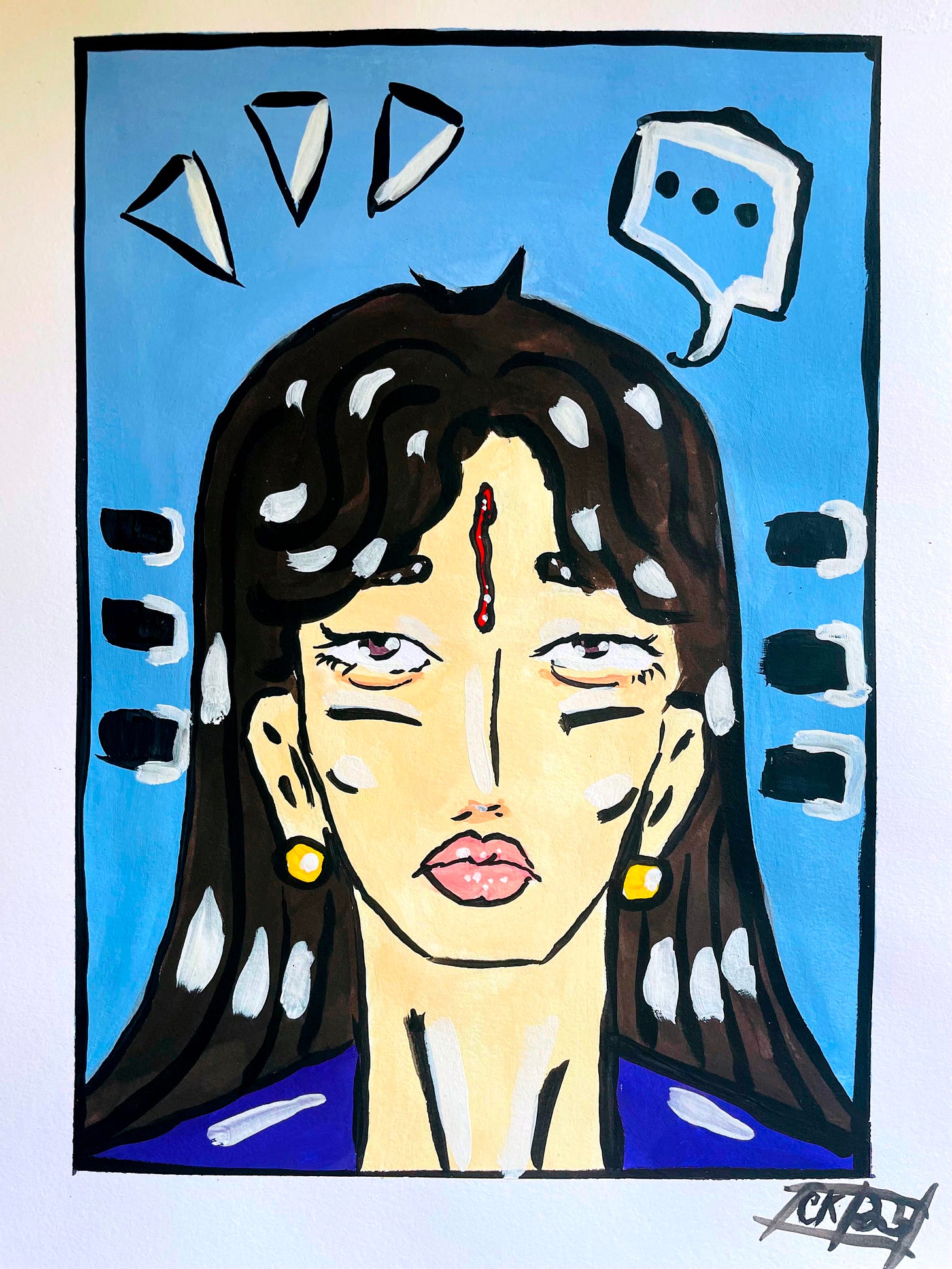“Kill All, Orpheus,” words and music by Brian Kennedy, recorded 2017 in Dauphin Island, Alabama.
“Now voices crying loud were heard at once —
the souls of infants wailing…”
- Virgil, Aeneid, Bk. VI
Certain stories demand an offering.
In the banquet hall of Alcinous, king of the Phaeacians, the hero Odysseus recounted for the royal assembly his passage to the nations of the dead, the cold home of woe. He sought there from sovereign Death counsel with the shade of blind Tiresias, the Theban prophet, pouring out upon the haunted ground generous libations of milk and honey, water and wine… but also black blood drained from the flesh of lamb and ram and ewe, a taste of which might give the dead a voice, and so secure for much-enduring Odysseus safe passage home.
When I first began this project — chronicling America in its age of abortion, those post-war decades when the practice emerged as mother tongue of the national imagination — I thought it clever to suggest the dead as restless, in need of voice. I imagined it would be easy, listening to them speak.
Instead I’m lost, stumbling in a valley of bones.
A voice was heard in Rama, weeping and loud lamentation; Rachel weeping for her children, and she would not be comforted, because they are no more.
For over half a century, abortion has been the leading cause of death in the United States, yet never reckoned as such — never reckoned as death and so obscured. As though written in smoke. Always, I marvel at the scale of loss, and in its very midst, its rack and ruin, our still boundless faith in the nation’s better angels — come now, let us reason together — as though we could articulate across the cultural rift an actual politics of catastrophe, conjuring amity from opposition by force of will alone. “We must not be too prodigal with our angels,” Borges warned, “they are the last divinities we harbor, and they might fly away.”
In America in this age of abortion, we’re asked to tally raindrops as a tempest rages; taught to gather apples as the orchard burns. Death has undone the many, and left us reeling.
“I had my second abortion after I’d been living with a guy for two years. I missed a couple of pills and got knocked up. I must have done it on purpose. I really believe that. I love children, you know… I was old-fashioned enough with this guy to want to have his baby, but not admitting it to myself. I was really half-assed.
“He was very sensitive. He sort of wanted to have the baby too, but then he said I better have the abortion. So I did. I had a general anesthetic that time, which was much easier. Afterwards he drove me home and I felt rotten, all sick and depressed. I felt hot and feverish. I lay down on the bed and asked him for tea and the sympathy that went along with it. He was out of the room for forty-five minutes and I thought I was going to die for needing someone. I went out into the next room, and there he was just looking at the colors on the wall. Instead of getting me the tea, he had dropped acid.
“‘What happened?’ I said. ‘It’s been a hard day for me,’ he said. ‘A hard day for you?’ I said. ‘I was the one who went through it. You just had to sit in the waiting room.’ The little creep. I wanted arms around me and to be cuddled, and he thought he’d had a hard day. I went crazy.
“I started beating him up. I grabbed the lamp and shattered it on his back. Then I swung a baseball bat at him, but he got away. So I jumped on him and started beating him with my fists. I was bleeding all over the place and all over him. I beat the crap out of him. He ran out the door and I locked it behind him and shoved a chair under the knob to keep him out.”
Whole galaxies of grief, whirling through indifferent void, untutored by mercy.
But still… out here in Oklahoma, on the southern plains, in a small museum only an hour’s drive from our home, rests the oldest painted artifact in North America, a prehistoric bison skull — over ten thousand years old — delicately adorned with streaks of brilliant red hematite lightning. The Cooper Bison Skull was gathered in the summer of 1994 at an archaeological dig adjoining the Beaver River in northwest Oklahoma, in a gully where the animals were once trapped and slaughtered by our ancient countrymen in that impossibly antique time before the pyramids, before Moses or Pharaoh, before Odysseus sailed for Troy.
Perhaps this painted skull — found trapped between two seasons worth of bone, “repositioned to look straight down the arroyo in the direction of oncoming animals” — was objet d’art for some sort of magical reciprocity: red lightning calling the living bison to itself with thundering hooves. No one knows for sure. But consider that after the skull was unearthed, over five inches of unseasonable summer rain fell upon those dry and dusty bonebeds in northwest Oklahoma, as though the offering still had power, after ten thousand years, to call upon its trinity of storm: lightning, thunder, and rain. Consider also that once the skull was processed, and finally installed in that small museum only an hour’s drive from our home — that first night another Oklahoma thunderstorm passed directly overhead, the roof of the museum leaked, and again the painted skull was doused with rain. It still happens, they say, from time to time — curators needing to adjust the exhibit, to account for the skull’s peculiarities, its potency. An offering to outlast us all.
As artists, we should ideally strive for such genuine and self-transcending impact, daring to avoid what Steiner termed “the pornography of insignificance” — art devoid of any moral weight, and so useless for the thriving of the tribe. “If there is still one hellish, truly accursed thing in our time,” Antonin Artaud declared, “it is our artistic dallying with forms, instead of being like victims burnt at the stake, signaling through the flames.”
So again I suggest, without being clever, that in America the dead are restless. In this age of abortion, the underworld has overflowed its bounds. The scale of loss demands an offering, far beyond what we might gather from politics, or law, or even insurrection. The scale of loss demands a recognition. What happened? And why? How could a once great nation, in a dream of progress, devour its own children? Entrust itself to an ideology of violent desire?
“On abortion days Sarah would arrive early, preparing a supply of translucent plastic containers labelled with each patient’s name and last menstrual period date, as well as a cache of white mesh netting wound in channels and cut to length. Nested within each container, with one end attached to the suction and the other knotted shut, the length of mesh would gather the fetal remains vacuumed from the patient’s womb, while the mingled blood of mother and child would instead pass through and collect in the cup.
“Eventually, for her good work in the procedure room, the clinic administrator started asking Sarah to cover shifts in an adjacent room called POC — product of conception — into which each labelled container was passed once an abortion was completed. Here, Sarah would empty the fetal tissue onto a clear glass pie plate, then begin piecing the aborted child back together, accounting for the entirety of its remains, ensuring no portion of the fetus was left behind in the patient before she was allowed to leave the clinic. Sarah would see the skull, the spinal cord, the legs and arms — sometimes even all the fingers on a hand, perfectly formed. Once, while accounting for aborted twins, she thought of her own brothers, also twins, and marveled to herself that this is what the two must have looked like in the womb.”
But even history is not enough. Men and women have always sought to kill their children, but only in our time has abortion grown into a way of life, a culmination, a cult of unchecked grief and greed. In 2023, the first full calendar year after the Dobbs decision overturned Roe v. Wade, America reckoned over one million abortions for the first time in over a decade. Pro-life advocates speak of a growing hardness of heart, a troubling moral distance, in the pregnant women they try to counsel. The shadows lengthen.
“Herbal abortion is an extremely viable option but only when added to an already naturalistic view of the human body and reproductive system. You see, when a woman is ovulating (usually 7-14 days after your period), she [is] primed and ready for pregnancy. In fact, during ovulation our immune systems are almost always lower than in the rest of our cycle. This means that our bodies can’t recognize sperm — that sticky wet stuff — as a foreign and conspiring agent. So our bodies just allow the baby-causing army in as if it were no big deal. If you allow these squirmy intruders on your sexy and fertile soil they will set up shop and if they have it their way, you will be pregnant.
“So your soil has been invaded while your immune commanders were at lunch and now [you’re] fucking pregnant. Okay, what really sucks is that those little over the counter tests that we all love to steal are not going to give you reliable results until you’ve already missed your period. Herbal abortions are most effective when taken around the time that you would be receiving your next gift of flow. So if you wait for the test to confirm your suspicions you will have less time to act. So ladies be smart and keep tabs on that sexy and beautiful body. If you are pregnant your tits and belly will be swollen and warm, you’ll pee a lot, you may puke, you’ll probably be dizzy, and you will have bouts of fatigue that will pair themselves with spells of intense focus that border on euphoria. This euphoria can be attributed to a tell-tale sign of pregnancy… the ‘glow.’ Women glow when they are pregnant, I shit you not. So [you’re] pregnant and it is within the first eight weeks of your pregnancy, your fetus and its fate are yours; herbal abortion can personalize your experience.
“Okay, here’s what you do. Call your local abortion provider and set up an appointment, you can always cancel it silly!! Cancel! Cancel! Cancel! Now, breathe and find yourself someone that you love and trust who can provide support and strength through this herbal extravaganza. NOTE: this person may or may not be the father of your fetus. Remember hot stuff, for this herbal remedy to work you have to be at the end of your cycle because you cannot abort an egg before it has attached itself to your uterine wall. Wow, getting lots of Vitamin C and taking wild carrot seeds can help the sperm invaders from attaching to your sacred wall! Preventative Measures! Counter Attack! So here’s the recipe that has saved my ass from the waiting room and vacuum. Remember, herbs are not toxic, but if they can defeat your invaders and kill your fetus they are powerful things and not to be fucked with by the un-educated. Talk to you local herbalist and the health food store or get yourself a kick-ass field guide to herb harvesting and like I said earlier, have a back up plan!”
There is no middle path. The darkness will not stop until it swallows us whole.
An offering, then — efficacious for its task. For the comfort of the restless, in need of voice. For our voyage homeward. For the thriving of the tribe.
In his own embassy to the dead, the bard Orpheus, grieving, brought music to the dim and silent shores, startling the torments of the damned. “Tantalus tried no more to reach for the water,” Ovid relates, “And Sisyphus climbed on his rock to listen.” Even the Furies wept. With song, Orpheus rescued his bride Eurydice from the clutch of shadow, and though his nerve later failed, his music never wavered.
But still… in his Metamorphoses, Ovid records a curious and disconcerting detail about the fate of Orpheus — how after losing his bride a second time, the bard wandered alone for three entire years, despondent, rejecting the attention of adoring women. Instead, the poet relates, Orpheus found his comfort elsewhere:
His love was given To young boys only, and he told the Thracians That was the better way: enjoy that springtime, Take those first flowers!
Such a detail might seem wildly out of place in this discussion of American abortion — but it isn’t, I assure you. Instead it reminds me, in considering an offering, in considering this chronicle, just where I should begin.
- Sixth Sunday of Easter, 2025
Brian Kennedy is the founder of Lydwine, as well as the frontman and principal songwriter of the arthouse country band The Cimarron Kings. He lives with his wife and six children in Guthrie, Oklahoma.
NOTES. In both substance and style, this piece draws heavily on Robert Fitzgerald’s translations of Bk. VI of The Aeneid and Bks. X and XI of The Odyssey in their Vintage Classics Editions, 1990 - Matthew 2:18 - Jeremiah 31:15 - Isaiah 1:18 - Jorge Luis Borges quoted from “A History of Angels,” (1926) translated by Esther Allen - “I had my second abortion…” quoted from Linda Bird Francke’s The Ambivalence of Abortion, Random House, 1978 - For the Cooper Bison skull, see Leland Bement’s Bison Hunting at Cooper Site: Where Lightning Bolts Drew Thundering Herds, Oklahoma University Press, 1999 - George Steiner quoted from his Real Presences, University of Chicago Press, 1989 - Antonin Artaud quoted from The Theatre and Its Double, translated by Mary Caroline Richards, Grove Press, 1958 - “On abortion days Sarah would arrive early…” quoted from Lydwine’s profile of former abortion clinic worker Sarah Eubanks - “Despite Bans, Number of Abortions in the United States Increased in 2023” (Guttmacher Institute, 2024) - Manifesto for the joys of herbal abortion quoted from D.I.Y Guide II, CrimethInc., 2012 - Ovid’s Metamorphoses translated by Rolfe Humphries, Indiana University Press, 1955.












Share this post